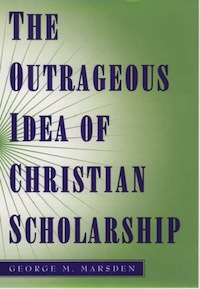
George Marsden, Notre Dame’s Francis A. McAnaney Professor of History Emeritus, wrote The Outrageous Idea of Christian Scholarship (New York: Oxford University Press, 1997) to take a step toward clarifying what the ancient enterprise of relating faith and learning might mean in the academy today (preface). How can this be accomplished in a time when the university has lost the ability to have substantive conversation regarding not only religion, but also anything that goes beyond the practical to the larger issues of life? Marsden boldly asserts that the assumptions of our hollow contemporary university culture must be re-examined, in particular our rejection of ancient religious learning and its bearing on what one thinks about (p.4). Over the course of The Outrageous Idea of Christian Scholarship, Marsden delineates guidelines for religiously informed scholarship; guidelines that he believes will lead to scholarship that can be accepted as legitimate in the mainstream academy.
Is that outrageous? What do you think? Note: If you haven’t already done such, time to pick-up the book and begin reading 😉
The Outrageous Idea of Christian Scholarship emerged from Marsden’s responses to the critiques and questions raised by his provocative Concluding Unscientific Postscript to The Soul of the American University: From Protestant Establishment to Established Nonbelief (New York: Oxford University Press, 1994). His Concluding Unscientific Postscript digs into
- higher education’s a priori rejection of all religiously based claims as unscientific
- pluralism as a basis for imposing uniformity
- academic freedom
- relationship between church and state.
Marsden wraps up with this challenging summary:
In many of the American colonies all the citizens were taxed for the support of the established religious group, regardless of the citizen’s religious affiliations. In the nineteenth century the Protestant establishment became informal and declared itself nonsectarian. Today nonsectarianism has come to mean the exclusion of all religious concerns. In effect, only purely naturalistic viewpoints are allowed a serious academic hearing. As in earlier establishments, groups who do not match the current national ideological norms are forced to fend for themselves outside of the major spheres of cultural influence. Today, almost all religious groups, no matter what their academic credentials, are on the outside of this educational establishment, or soon will be, if present trends continue. Americans who are concerned for justice ought to be open to considering alternatives (440).
As we begin our on-line conversation of The Outrageous Idea of Christian Scholarship, please share your thoughts on some/all of the below questions.
- What’s so outrageous about Christian scholarship? Why does the term Christian scholarship stimulate a negative knee-jerk reaction by some Christians and non-Christians? Do nonreligious viewpoints receive special privilege in higher education (24)?
- Has a negative knee-jerk reaction to Christian scholarship (or religiously informed scholarship in general) receded in higher education over the past decade? Is Christian scholarship (or religiously informed scholarship in general) now accepted through the lens of pluralism? If so, please share some examples to bless one-another.
- In your experience, how do you find Christian faith and scholarship to helpfully (and possibly unhelpfully) relate?
- Do you agree with Marsden that faith precedes and conditions understanding? (p. 9)
- Any particular points/quotes in the introduction or first chapter which you desire to draw our attention to and possibly even discuss?
Note: as mentioned in a previous post, if you’d like to host a face-to-face book club coinciding with our online discussion, we recommend that you download the ESN discussion guide.
Tom enjoys daily conversations regarding living out the Biblical Story with his wife Theresa and their four girls, around the block, at Elizabethtown Brethren in Christ Church (where he teaches adult electives and co-leads a small group), among healthcare professionals as the Northeast Regional Director for the Christian Medical & Dental Associations (CMDA), and in higher ed as a volunteer with the Emerging Scholars Network (ESN). For a number of years, the Christian Medical Society / CMDA at Penn State College of Medicine was the hub of his ministry with CMDA. Note: Tom served with InterVarsity Christian Fellowship / USA for 20+ years, including 6+ years as the Associate Director of ESN. He has written for the ESN blog from its launch in August 2008. He has studied Biology (B.S.), Higher Education (M.A.), Spiritual Direction (Certificate), Spiritual Formation (M.A.R.), Ministry to Emerging Generations (D.Min.). To God be the glory!

Leave a Reply